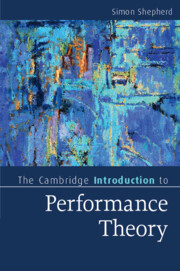Book contents
- Frontmatter
- Contents
- Preface
- Part I Definitions of performance
- Part II The emergence of performance as sensuous practice
- Part III Theorising performance
- 15 Performance, postmodernism and critical theory
- 16 What Performance Studies is: version 1: New York and Northwestern
- 17 What Performance Studies is: version 2: Oral interpretation
- 18 How Performance Studies emerged
- 19 Gender performativity
- 20 Performance and performativity
- 21 The relations between performance, theatre and text
- 22 The magic of performance
- Closing note
- References
- Index
- Cambridge Introductions to …
19 - Gender performativity
from Part III - Theorising performance
Published online by Cambridge University Press: 05 February 2016
- Frontmatter
- Contents
- Preface
- Part I Definitions of performance
- Part II The emergence of performance as sensuous practice
- Part III Theorising performance
- 15 Performance, postmodernism and critical theory
- 16 What Performance Studies is: version 1: New York and Northwestern
- 17 What Performance Studies is: version 2: Oral interpretation
- 18 How Performance Studies emerged
- 19 Gender performativity
- 20 Performance and performativity
- 21 The relations between performance, theatre and text
- 22 The magic of performance
- Closing note
- References
- Index
- Cambridge Introductions to …
Summary
A few years before Schechner told his colleagues to abandon old-fashioned theatre studies a new concept had appeared on the scene. This concept was to be adopted by Performance Studies and would become a major reference point for the efficacy of performance, even though it had arrived via theatre and indeed text. The impetus behind its formulation was derived from that source of so much political and theoretical innovation in the period, feminism and its distinct point of arrival was an essay in Theatre Journal, edited by Sue-Ellen Case and Timothy Murray. The essay, which appeared in 1988, was called ‘Performative Acts and Gender Constitution’, written by Judith Butler.
Back in 1988 that first word of Butler's title had less resonance in drama and theatre scholarship than it might have done in anthropology or linguistic philosophy, but that very soon changed. In 1990 the essay was reprinted in Case's anthology Performing Feminisms, and from here it was picked up by many theatre academics. Jill Dolan, for example, used it in her contribution to Reinelt and Roach's book in 1992. By the early years of the new century, ‘performativity’ had become the seemingly regular, if not obligatory, partner to ‘performance’. But, although this now seems a perfectly natural pairing, like some of the most enduring relationships it began with arguments. Somewhat more alarmingly – at least as far as my metaphor is concerned – in the evolution of this relationship one of the partners appeared to lose their identity.
‘Performativity’ had made its significant arrival into academic discourse in the mid-1950s in a series of lectures on linguistic philosophy by J.L. Austin. In the years that followed, it was the subject of hilariously acrimonious philosophical dispute between Jacques Derrida and John Searle, but this had next to nothing to do with performance as hitherto understood. An exception was Tambiah's suggestion in 1979 that Austin's performativity might be employed as a way of thinking about ritual practice. In ‘A Performative Approach to Ritual’ Tambiah suggested three ways in which ritual could be thought of as performative: ‘in the Austinian sense of performative wherein saying is also doing something as a conventional act; in the quite different sense of a staged performance that uses multiple media by which the participants experience the event intensively; and in the third sense of indexical values …
Information
- Type
- Chapter
- Information
- The Cambridge Introduction to Performance Theory , pp. 184 - 189Publisher: Cambridge University PressPrint publication year: 2016
